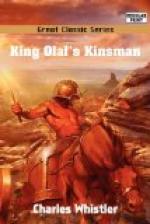“See yonder,” he said, and pointed eastward across the river and marsh. “There is the hill where our standard has been raised time after time since OElla and Cissa drove in flight the Welsh who had raised theirs in the same place before us. There will I raise it again against Cnut or Streone or any other of his men.”
“Edric Streone is with King Ethelred,” said Olaf; “he is not Cnut’s man.”
“He has been Swein’s man; and if it suits him will be Cnut’s. I will not alter my saying of him.”
“Ethelred believes in him,” answered Olaf, “and Eadmund the Atheling believes in him as in himself.”
“So much the worse for them,” said the earl; “you will see if I am not right. I know Edric Streone over well, and he knows it, and hates me.”
“Come, therefore, and take Ethelred out of his hands,” Olaf said.
“Not I. Let him inlaw me again first. I will not go and ask pardon for what I have not done.”
And after that the earl would say no more on the matter, waxing wroth if Olaf would try to persuade him. So it seemed that our journey was lost; and Olaf began to be anxious to return to the Thames, where our ships should go into winter quarters. But the wind held in the east, and kept us for a while.
Wulfnoth was not sorry for this, for it was full harvest time, and he sent his housecarles out to his other manors to gather it, so that he had few folk about him. Godwine went with them to a place on the downs called Chancton, where was a great house of the earl. We parted unwillingly; but we might sail at any time if the wind shifted, and the earl would have him go.
“When you have done with fighting for Ethelred the Unredy,” said the boy to me, “bring Olaf back here, and you and I, friend Redwald, will go a-viking with him. He says he wants to go to Jerusalem Land some day—and that would be a good cruise.”
Now the day after the housecarles left Pevensea, there befell a matter which would have brought them back hastily had we not been in the haven. There was always a beacon fire ready to recall them, and they watched for it even as they wrought in the upland fields, or if they were among the woods. Turn by turn one would climb to a place whence it could be seen, for one may never know what need shall be on our English shores, and I was to learn that need for arms might be in a forest-girt land also, from foes at home.
Olaf and I were in the ships. The wind was unsteady, and it seemed that a shift was coming with that night’s new moon, and we were preparing for sailing. And from our decks we saw a little train of people crossing the difficult path from the mainland to the island that folk can only use when the tide is low, and then only if they know it well or have a guide to lead them. They say that once the path was always under water, but that the land grows slowly, and that at some time the island will be joined to the low hills that are nearest to it on the northwest.




